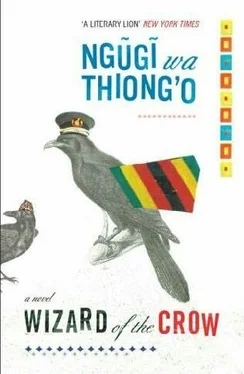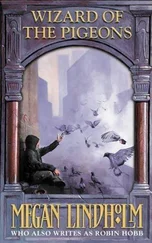The rider would have been executed except for his pleas that they should not kill the Ruler’s messenger without reading a note he had sewn inside his jacket to ensure its safety. And, sure enough, the piece of paper was discovered, and when the police unfolded it, they saw its heading, Messengers of the Ruler, and a line below, To My Messenger to the Central Region, followed by a directive to the rider to tour the region spreading the gospel of queuing. It said that the Ruler would be pleased with those who had heeded the call, and, most important, it ended with the Ruler’s clearly legible signature. The police chief referred the matter to Sikiokuu, who remembered writing such words and who took the piece of paper to the Ruler, who, when he saw that the signature was his, rescinded the earlier order and said that the rider should be told that the Ruler had felt mercy. The rider was to go away, shave, and cut his hair short, then take an indefinite leave without pay. The rider pleaded, pointing out that he had faithfully executed the spirit and letter of the Ruler’s command, setting in motion another round of consultations, after which he was assured that he could return to duty after several months of needed rest; he would be put under Kaniürü’s command as a road specialist in case it became necessary to track the students of the central region.
Kaniürü could not believe his luck. He had not known where or how he would start the search, but now? He hated university students with a passion, for their radicalism had deprived him of a good wife. If Nyawlra had not entered student politics, she might very well still be living under his protective wings. He dwelled on the news brought by the crazy rider. These students had been behind the snake incident at the aborted birthday ceremony. They were definitely behind the recent queuing mania. Kaniürü recalled that even the Ruler had said that students and youth caused the downfall of many a government. And all at once he saw the solution, simple but effective. Crush the university students, and all forms of queuing would come to an end. But how would he go about it? The students had been poisonously indoctrinated. Empty their heads of all foolishness and fill them with good and correct ideas supportive of the State. But how would the government go about this?
Kaniürü recalled that, according to the recent reports, the students were demanding to be taught about their own country first. Was the Ruler not the Country? Kaniürü immediately got pen and paper and started drafting a memorandum for a new national education program. Everybody in Aburlria knew that the Ruler was the supreme educator. Teacher number one. So all institutions of learning, from primary schools to university colleges, would be required to teach only those ideas that came from the supreme educator. They would be required to offer the Ruler’s mathematics, the Ruler’s science (biology, physics, and chemistry), the Ruler’s philosophy, and the Ruler’s history; and this would definitely take care of their demands to know their country first. But the students also wanted to be taught how their country was related to other regions of the world. That was also quite simple. They would be taught the geography and demographics of all the countries the Ruler had visited or intended to visit. As for the books to read, this too was simple. In recognition of the fact that the Ruler was the number one writer, all books published in the country would carry the name of the Ruler as the original author. Anybody who aspired to write and publish could do so only under the name of the Ruler, who would allow his name only on those books carefully examined and permitted by the subdepartment of Youth Conformity. All new editions of the Bible, the Quran, the Torah, and even Buddha’s Book of Light, or any other religious texts read in schools, would have prefaces and introductions by the Ruler. Such an education system was bound to produce students with a uniform knowledge streaming from the same source: the Ruler or those imbued with his thought.
Kaniürü formed an advisory board consisting of university professors from history, literature, political science, law, philosophy, and the sciences. They were all members of the Mighty Youth and under his command. He gave them the memorandum and asked them to look at it critically and make comments and necessary corrections, but they all came back full of praise: the document was well written and it contained the best educational program they had ever seen. They sat down to work out the best way of effecting this educational initiative, and they were all of the view that the best way was to sell the idea to university and secondary school students. Once the students had accepted it, and the advisory board did not see a problem in this, since the memorandum had met all the student demands, Kaniürü would present it to the Ruler for it to become the official government policy on education. They gave the memorandum a weighty but memorable title: The Kaniürü Memorandum on New Educational Initiatives for Youth and Women to Make Their Minds Conform to National Ideals and the Ruler’s Philosophy.
One of the professors, a specialist in all aspects of parrotology, came up with the idea of regional seminars to educate students and the public about the new educational program. The first seminar was to be held in Eldares, and Kaniürü was charged, at his own suggestion, with seeing whether the Ruler himself would open the proceedings.
Kaniürü simmered in joy. He knew that the Ruler could not make it to the seminar. But he did not mind his name being mentioned in the same breath as the Ruler’s. But a message, a word or two of greetings from the Ruler, would suffice.
There is nobody quicker to anger than a thief who has been robbed. This adage was no less true in the case of Silver Sikiokuu, Minister of State in the Ruler’s Office, for though over the years he had extorted bribes in the millions and did not see anything wrong with that, he now felt hurt and aggrieved that the Ruler had ordered him to repay money of which he had not seen a cent. He had been clueless about Kaniürü’s exploitation scheme in connection with Marching to Heaven. What pissed him off even more was that he had groomed the youthwinger into prominence. Why are people so untrustworthy? he asked himself time and again. How could Kaniürü be so ungrateful to his benefactor? He thought of avenging himself against Kaniürü, but he could not figure out how to land a stinging blow. The only light in his dark night was the Ruler’s promise to relieve him of his debt should Nyawlra be captured. But so far she had proved depressingly elusive.
One day, in the throes of his agony, Sikiokuu received a notice about a parcel awaiting him at customs. He dispatched a courier to fetch it. It was one of the mirrors he had ordered from London, and it was soon followed by many more from Tokyo, Rome, Stockholm, Paris, Berlin, and Washington.
Sikiokuu shook his ears for joy at the goodness of the omen. He started imagining how he would capture Nyawlra, drag her before the Ruler, and dramatically announce: Here is your enemy-what do you want me to do with her? What would the Ruler say? You have done well, you faithful and loyal minister, and I forgive the money you owe me; from now on you may do whatever you want to those who have wronged you and especially those who have falsely accused you of corrupting the bidding process of Marching to Heaven. However, the clarity of his daydreams was muddled by a concern: the mirrors are here, but where is their handler and interpreter? Where is the Wizard of the Crow?
Sikiokuu was not happy that the Ruler had assigned the task of capturing the Wizard of the Crow to Machokali, because he still harbored fears that the wizard might disclose to his archenemy what he had gleaned about Sikiokuu’s ambitions. He would have wanted the task for himself, though he was ambivalent as to what to do with the wizard. On the one hand, Sikiokuu wanted him dead; yet the wizard was his only hope for finding Nyawlra. But what was Machokali up to? What had he set in motion to effect the capture of the Wizard of the Crow? He knew that Machokali would not disclose anything to him, that far from enlightening him he would more likely mislead him. Sikiokuu decided that he had to get to the Wizard of the Crow first. So the race was on.
Читать дальше












